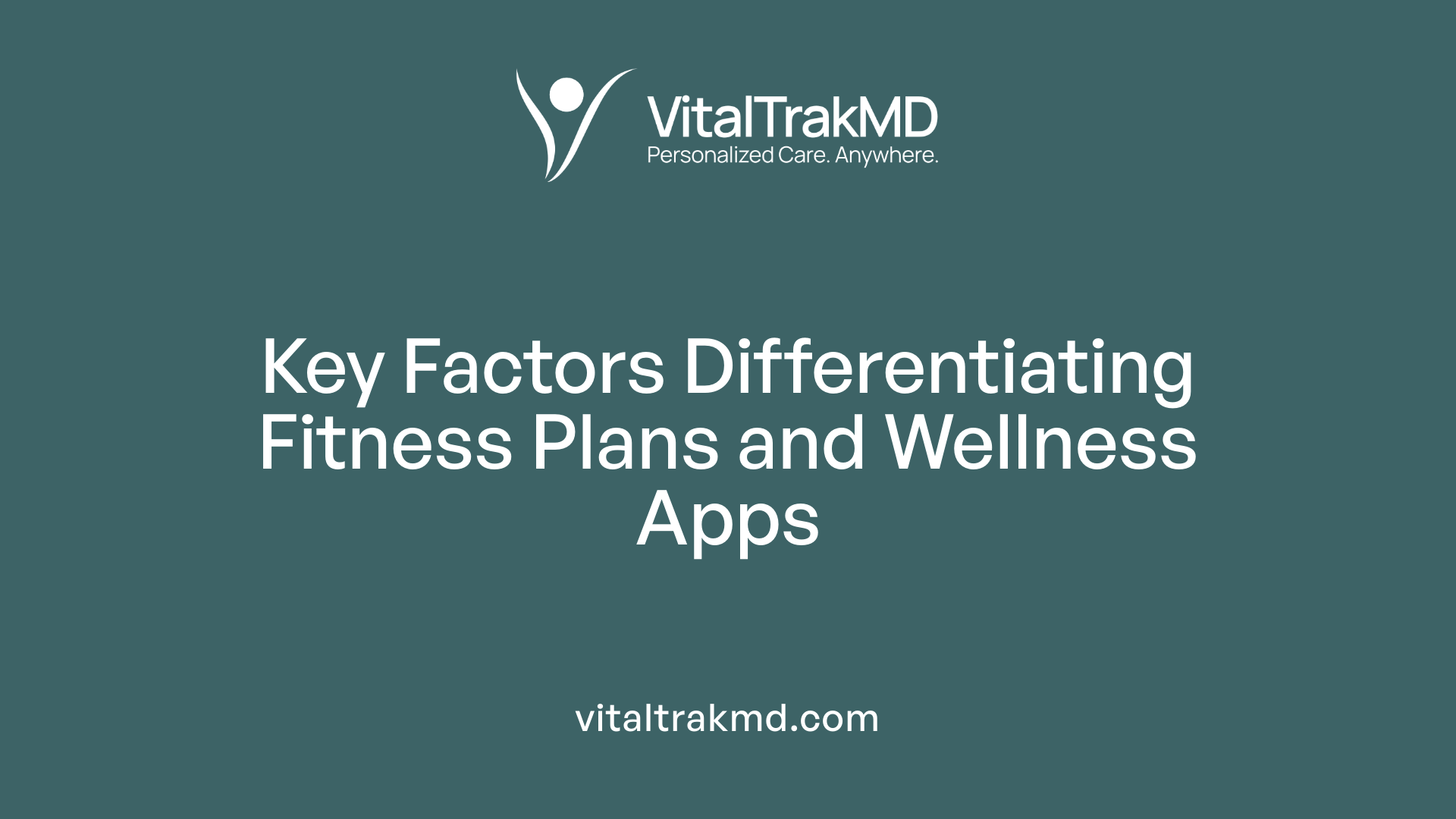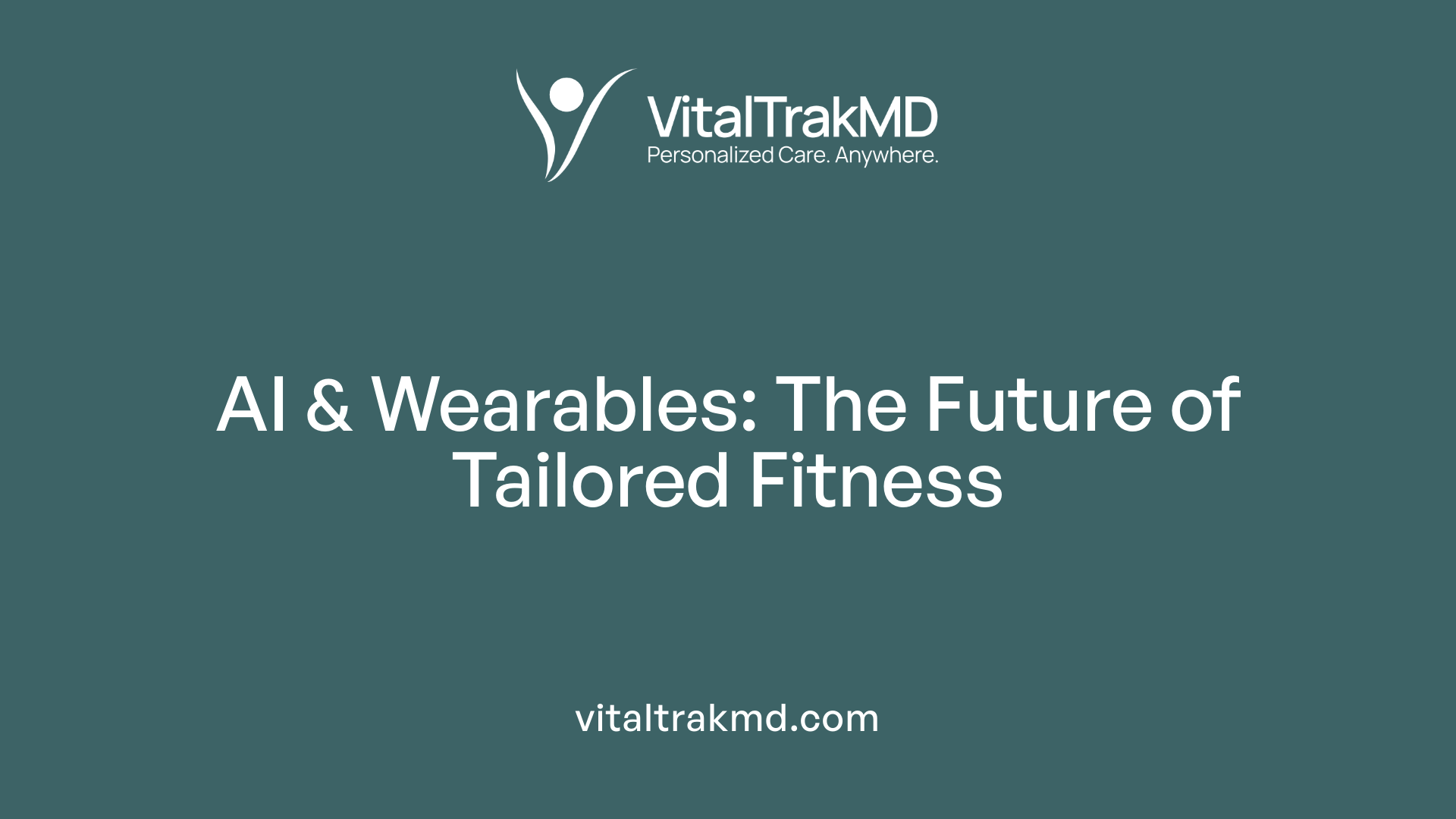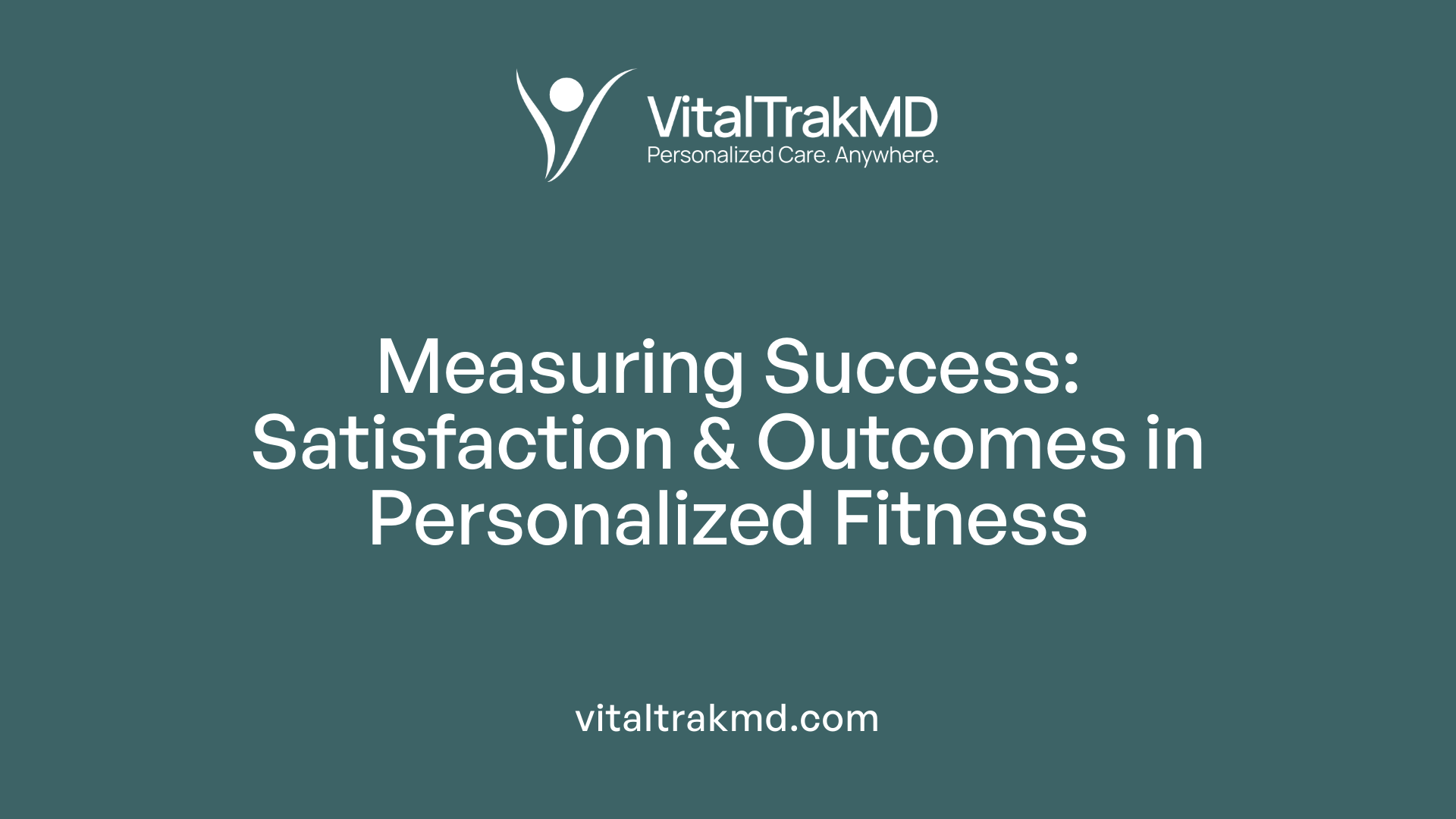Using a Personalized Program vs General Wellness Apps

Unlocking the Benefits of Tailored Health Interventions
The landscape of health and fitness is undergoing a paradigm shift, moving from one-size-fits-all solutions to highly personalized programs. As technology advances, consumers increasingly expect customized plans that adapt to their unique needs, goals, and lifestyles. This article explores the distinction between personalized programs and general wellness apps, examining their features, effectiveness, and the innovative technologies driving their development.
The Core Differences Between Personalized Fitness Plans and General Wellness Apps

How are personalization processes different?
Personalized fitness plans are built by collecting detailed data on an individual’s fitness level, goals, health conditions, and preferences. Professionals, such as personal trainers or specialized apps, analyze this data to craft a workout program that evolves based on the user's progress, needs, and changing circumstances like injuries or lifestyle shifts.
In contrast, general wellness apps tend to provide broad, standardized content aimed at a wide audience. They may include pre-designed routines for fitness, mental health, or nutrition without tailoring these suggestions to individual user data. While some wellness apps incorporate basic customization—such as adjusting difficulty levels—most do not analyze personal health records or real-time biological data.
What types of content are provided?
Personalized fitness solutions typically include specific exercise routines, mobility and strength assessments, and nutrition guidance tailored to the user’s unique profile. They often incorporate real-time feedback and adjustments, ensuring safety and effectiveness.
Broad wellness apps, however, offer a range of content like workout videos, meditation sessions, diet tips, sleep trackers, and mental health articles. These are generally designed for mass consumption and offer a one-size-fits-all approach.
How do they motivate and keep users engaged?
Personalized programs use targeted notifications, adaptive challenges, goal tracking, and motivational messaging based on individual data. For example, they can suggest new exercises when progress stalls or adjust the intensity to prevent burnout.
General wellness apps try to motivate users through community challenges, achievement badges, educational content, and reminders. However, since their content isn’t tailored, they may sometimes lack the personal relevance needed to sustain high engagement levels.
What is the scope of health management?
Fitness-specific plans focus primarily on movement, strength, endurance, and sometimes nutrition, aiming at improving physical fitness or accomplishing specific goals like weight loss or muscle gain.
Wellness apps often cover a broader spectrum of health aspects, including mental health, sleep, diet, stress management, and habits. While they assist in overall well-being, they typically do not provide deep, personalized interventions for each area.
How do these differences impact user experience?
Personalized fitness plans deliver targeted, relevant content that adapts to the user’s evolving needs, leading to faster progress, higher motivation, and lower injury risk.
General wellness apps serve as accessible entry points into health management but may lack the depth of customization needed for specific fitness or health goals. Users might find these apps more suitable for maintaining general well-being but less effective for targeted results.
| Aspect | Personalized Fitness Plans | General Wellness Apps | Additional Details |
|---|---|---|---|
| Customization | Extensive, data-driven | Basic or generic | Ranges from advanced AI adjustments to pre-set routines |
| Content Focus | Exercise, nutrition, real-time adjustments | Lifestyle, mental health, sleep | Varies based on user profile and goals |
| Engagement Methods | Notifications, adaptive challenges, progress feedback | Community, badges, reminders | Designed to keep motivation high through relevance |
| Scope of Health Management | Movement, strength, specific fitness goals | Overall lifestyle, mental wellness | Broader but less in-depth in specific areas |
| Impact on Outcomes | Faster, safer, more targeted progress | General health improvement | Personalized plans better suited for specific results |
In summary, while general wellness apps provide valuable tools for broad health and lifestyle management, personalized fitness plans stand out by customizing every aspect of the experience. Such tailored approaches leverage detailed data and real-time adjustments to support users in achieving precise fitness and health objectives more effectively.
Technological Innovations that Drive Personalized Fitness and Wellness Solutions

What technological advancements are driving innovations in personalized workout solutions?
Recent technological advances are transforming personalized fitness. The rise of wearable devices, such as fitness trackers and smartwatches, enables continuous data collection on users' activity, heart rate, sleep, and more. These devices feed data into AI-driven algorithms that analyze individual responses and adapt workouts dynamically.
Unmanned gyms showcase how technology can create flexible, accessible training environments. These gyms incorporate environmental sensors, smart access control systems, and cloud-based management to deliver tailored experiences without a human trainer.
Equipment innovations like Technogym's BIOCIRCUIT demonstrate the power of technology in creating customized workout routines. This connected equipment uses BIODRIVE technology, based on aerospace tech, to learn user biomechanics and modify exercises accordingly.
Mobile apps and facial recognition further streamline access and personalization by enabling effortless class reservations and data synchronization. All these technologies work together to optimize workout effectiveness, help prevent injuries, and keep users motivated, revolutionizing personalized fitness solutions.
How is AI used to customize workout plans and improve user engagement?
Artificial intelligence plays a pivotal role in creating personalized fitness experiences. By analyzing data from wearables, including activity patterns, sleep, and physiological responses, AI systems generate tailored workout routines.
These algorithms adjust exercise types, intensity levels, and progression pathways based on individual goals and health conditions. Virtual trainers, powered by AI, offer real-time coaching, feedback, and motivation, maintaining higher levels of user engagement.
Immersive technologies like virtual reality (VR) and augmented reality (AR) incorporate AI to craft motivating environments and challenges that adapt to user performance. This approach not only personalizes the experience but also boosts adherence by reducing boredom and providing a sense of achievement.
Overall, AI-driven customization enhances workout relevance, encourages consistency, and drives better health outcomes, proving essential in modern personalized fitness platforms.
Evaluating the Effectiveness and User Satisfaction with Personalized Programs

What impact do personalized fitness plans have on motivation and adherence?
Personalized fitness plans significantly boost motivation by aligning exercises with a user’s specific goals, preferences, and fitness levels. When individuals see progress tailored to their unique circumstances, they are more likely to stay engaged and committed. Moreover, these plans adapt over time, making workouts more effective and preventing plateaus, which sustains users’ interest.
User engagement metrics, such as sustained usage over months and increased step counts, reflect improved motivation. For example, studies report that users of apps providing personalized activity suggestions experience notable increases in physical activity levels, especially among overweight or less active populations. Feedback from users indicates that feeling in control of their workouts and seeing customized progress enhances adherence.
How do personalized plans contribute to safety and injury prevention?
Safety is a major advantage of individualized programs. Trainers and apps consider personal mobility, strength, and health restrictions when designing routines, minimizing injury risk. Proper movement techniques are incorporated, and modifications are suggested for injuries or health issues.
Apps that incorporate real-time coaching help users maintain correct form during exercises, further reducing the likelihood of injury. This personalized approach ensures exercises are appropriate for each person’s capabilities, making the workouts safer and more effective.
What are the long-term health benefits of personalizing fitness programs?
Long-term health benefits include sustained physical activity, improved strength and flexibility, and better weight management. Personalized plans promote holistic health by integrating nutrition guidance and behavioral support, which can improve mental health, sleep, and overall well-being.
Adjustments based on ongoing user data prevent burnout and adapt to life changes, such as injury or travel, maintaining consistency in fitness routines. Evidence shows that users of personalized health apps tend to develop healthier habits, leading to better health outcomes over months and years.
How do users perceive and engage with personalized fitness solutions?
User feedback emphasizes the importance of control and relevance in personalized programs. Many users appreciate features like tailored exercise suggestions and progress tracking, which increase motivation and confidence.
Engagement metrics reveal high usability scores, with users frequently returning to apps and actively participating in fitness challenges or community activities. Qualitative data indicate that autonomy and personalization are crucial factors that foster ongoing involvement and satisfaction.
What do research studies and industry trends reveal about personalized fitness solutions?
Research consistently shows that tailored interventions outperform generic programs in improving physical function, confidence, and adherence. Industry trends highlight a shift toward utilizing AI, wearable tech, and digital platforms to deliver adaptive, user-specific programs.
The integration of technologies like virtual reality and advanced analytics supports hyper-personalization, which enhances the user experience and results. The market’s growth, projected to reach trillions of dollars, exemplifies the increasing demand for personalized health and wellness solutions.
| Aspect | Findings/Trends | Details |
|---|---|---|
| Effectiveness | Studies confirm improved adherence and outcomes | Tailored programs lead to faster progress and higher satisfaction |
| Safety | Reduced injury risk with personalized modifications | Proper form guidance and attention to individual limitations |
| Engagement | High user retention with personalized content | App usability scores averaging above 5.6/7; increased activity levels |
| Industry Direction | Growing adoption of AI and wearable data for customization | Use of advanced tech to create real-time, adaptive fitness plans |
| Long-term Benefits | Sustained health improvements | Enhanced motivation, injury prevention, and holistic well-being |
Overall, the evidence illustrates that personalized fitness solutions effectively promote motivation, safety, and long-term health benefits, aligning with industry trends that favor technological integration and user-centric design.
Designing and Developing Personalized Fitness and Wellness Programs
How are personalized fitness plans developed to meet individual needs?
Personalized fitness plans are crafted through a thorough assessment process that considers various aspects of an individual’s health and fitness profile. Trainers and health applications analyze body composition, cardiovascular fitness, mobility, strength levels, and medical histories to understand baseline capabilities and limitations.
Modern technologies play a crucial role in this development. Wearable devices and mobile health apps continuously collect data on activity levels, sleep patterns, mood, and physiological responses. This real-time data enables the tailoring of exercise routines to fit individual needs precisely. Researchers also investigate genetic and microbiome insights to predict how different people respond to specific exercises or diets, aiming to optimize outcomes.
This data-driven approach involves collaborating with users to set realistic and motivating goals. The program then incorporates both physical activity and nutritional guidance, with the flexibility to evolve based on ongoing monitoring of progress. Adjustments are made regularly to keep the workouts challenging but safe, preventing stagnation and encouraging sustained motivation.
By leveraging advanced analytics, AI algorithms, and scientific insights, personalized programs deliver efficient, safe, and motivating fitness strategies that adapt to each user’s journey and unique biological makeup.
What are the considerations when developing personalized programs regarding user safety and data privacy?
Creating personalized health and fitness programs requires meticulous attention to safety and privacy. Safety considerations include customizing exercises to accommodate injuries or health conditions, ensuring correct movement techniques, and monitoring physiological responses to prevent accidents or overtraining.
Data privacy is equally important. Developers must implement transparent data practices, clearly inform users about what data is collected and how it is used, and obtain informed consent. Security measures like encryption, secure data storage, and multi-factor authentication are essential to protect sensitive health information.
Users tend to prefer personalized recommendations based on their self-reported preferences rather than information sourced from social media, owing to privacy concerns. Studies indicate that over 96% of participants would opt out of social media data-driven recommendations if given a choice, reflecting strong privacy preferences.
Offering users control over their data, providing options for the methods of personalization, and complying with data protection regulations foster trust and promote continuous engagement with personalized fitness programs. Safeguarding privacy and ensuring safety are critical to supporting user confidence and long-term success in personalized wellness initiatives.
| Aspect | Consideration | Example/Details |
|---|---|---|
| Safety | Custom exercise modifications | Adjusting routines for injuries or health issues |
| Privacy | Transparent data collection | Clear user consent forms |
| Security | Data encryption | Protecting health records |
| User Preference | Customization options | Choice between self-reported data or social media data |
| Technological support | Regular monitoring & updates | Using wearables for real-time feedback |
This holistic focus on safety and privacy not only preserves user health but also builds a trustworthy environment for long-term engagement in personalized fitness and wellness programs.
Market Trends and Future Directions in Personalized Health and Fitness
What are some research findings or industry trends that support the effectiveness of personalized fitness solutions?
Research and market trends increasingly validate the benefits of personalized fitness approaches. Scientific studies, including systematic reviews and real-world data, show that tailored exercise programs boost physical function, confidence, and adherence better than generic routines. For example, apps that adapt workouts based on user data—such as activity levels, health conditions, and progress metrics—enhance effectiveness and user satisfaction.
The rise of AI, wearable devices, and digital platforms has made individualized plans more accessible and precise. These tools analyze vast amounts of personal data to create fitness routines that align with specific needs, goals, and limitations. Moreover, societal shifts after COVID-19, with more people engaging in outdoor and at-home activities, highlight the importance of flexible, personalized options. Overall, evidence underscores that customized solutions lead to better health outcomes and greater motivation, aligning well with consumer preferences for personalized, effective fitness experiences.
What innovations are shaping the future of personalized fitness, and how are consumer preferences evolving?
The future of personalized health and fitness is driven by innovative technologies such as genomics, virtual reality (VR), augmented reality (AR), and advanced artificial intelligence (AI). Genomic analysis enables highly individualized nutrition and workout plans based on genetic predispositions, providing users with more effective and targeted health strategies.
VR and AR are creating immersive exercise environments, transforming typical workouts into engaging, gamified experiences. These technologies are particularly appealing to younger demographics who seek interactive and entertaining fitness routines. Big data analytics and machine learning further enhance personalization, delivering real-time adjustments and recommendations derived from continuous health and activity tracking.
Consumer preferences are shifting towards these highly engaging, customizable solutions that deliver seamless integration across devices and platforms. Users want flexibility, motivation, and a sense of control over their health journey. As a result, the landscape is moving beyond traditional personal training, offering accessible, tech-enabled, and deeply personalized health experiences that cater to diverse needs and lifestyles.
Embracing Personalization for Sustainable Health and Wellness
The integration of cutting-edge technology and scientific insights has fundamentally transformed health and fitness landscapes, making personalized programs more accessible, effective, and engaging than ever before. While general wellness apps serve a broad population with convenience and foundational health support, personalized fitness plans offer tailored, adaptive solutions that maximize individual potential and safety. Industry trends, research, and technological advancements all point toward increasing adoption of hyper-personalization, driven by wearables, AI, VR, and genomics. As consumer demands evolve, embracing individualized health strategies not only enhances motivation, safety, and efficacy but also paves the way for sustainable, goal-specific lifestyle changes. Ultimately, the future belongs to personalized health and fitness solutions that empower users to lead healthier, more active lives with precision and confidence.
References
- Why Custom Workout Plans Are Better Than Generic Fitness Programs
- The Effectiveness of Digital Apps Providing Personalized Exercise ...
- A personalized mobile app for physical activity - PubMed Central
- How Custom Wellness Apps Support Healthy Lifestyle - Fullestop
- Personal(ized) Training: The Next Frontier for Fitness Apps - Applause
- Personalized Fitness Plans via Mobile Health Technology - ACSM
- The Science Behind Personalized Workouts in Fitness Apps | FYI
- The Rising Influence of Health & Wellness Apps – Pros & Cons (Part ...
Recent articles
Want to Feel Better and Live Healthier?
Join hundreds of patients taking control of their health with personalized care that fits their life – not the other way around.
Rated 4.8/5 by 32+ customers







